Episodes

Wednesday May 24, 2017
The Last Five NFL Seasons With A Ten Minute Overtime
Wednesday May 24, 2017
Wednesday May 24, 2017
On Tuesday, the NFL owners voted to reduce the length of overtime in the regular season from fifteen minutes to ten minutes. According to Pro Football Talk, this will be a permanent change. This is coming just five years after the NFL modified the overtime rules to allow both teams a chance to possess the ball unless a touchdown is scored on the opening drive. Since the 2012 rule change went into effect, we have seen more ties in the last five seasons than in the previous 22 seasons combined. Now, with an even shorter overtime period to work with, there is concern among many that we are headed for ties at a historic rate.
Most news and blog sites have criticized this rule change because of the speculation that there will be more ties, but most stopped at speculation. Why speculate when we have real data that we can analyze to see how big of a problem this will be? With this in mind, I went back and looked at every overtime game since the 2012 rule changes went into effect to try to quantify how a 10 minute overtime would affect the occurrence of ties. Unfortunately, as I was preparing to write this, FiveThirtyEight published a much more statistically robust version of the article I was planning to write. They estimate that over 19% of overtime games will end in ties with these rules changes, compared to just 6% under the 2012-16 rules and 2% under the 1974-2011 rules.
While FiveThirtyEight provides a great statistical argument for how impactful this new rule may be, I thought I could provide a little historical twist and play a game of ‘What If…?’ What if a 10 minute overtime had been used since 2012? What results would have been different? How would the new rules have changed the NFL standings? How would that have altered NFL history?
Let’s take a look back at those 83 overtime games over the last five seasons and shorten them to 10 minutes. Even while acknowledging the near certainty that these games would’ve been played differently if the overtime rules were changed, you’ll see how big of a real-world impact a 10 minute overtime can have (and likely will have) on an NFL season.
First things first, here is the fate of those 83 overtime games if you reduced overtime to 10 minutes:

At first glance, it seems reassuring that 78% of the games would be the same under a 10 minute overtime. However, having a different outcome in 22% of games is very unsettling considering how tight most playoff races are in the NFL. What does that difference look like in the real standings? Let’s find out.
All standings and information was retrieved at Pro-Football-Reference.com. Bookmark it. It’s the best site on the Internet.
2012 NFL Season
There were a whopping 22 overtime games played in 2012. Just three of them would have had a different result with a 10 minute overtime rule. But those three games change a lot.
Games Changed

Revised 2012 NFL Standings
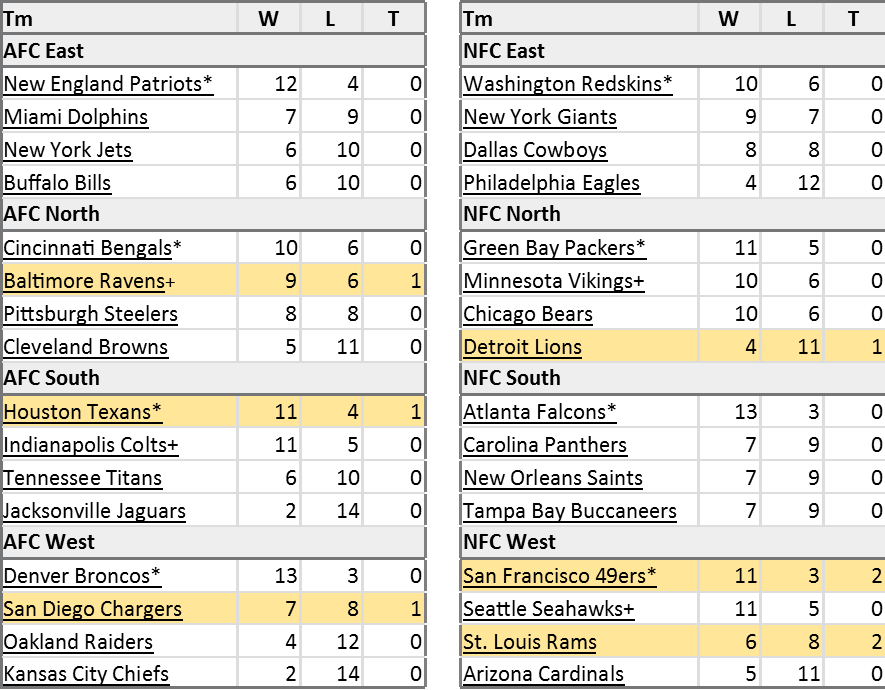
The first things that stand out to me are the hilarious records of the 49ers and Rams. The division rivals would have tied each other in both of their meetings. This came within seconds of actually happening. The Rams kicked the game-winning field goal with :26 remaining in overtime. No team has had two ties in a season since the 1973 Packers (the last year played with no overtime in the regular season). I would bet that will change in the years to come.
The Texans falling to 11-4-1 does nothing to change their playoff positioning, nor does it affect Detroit’s draft positioning. The Texans still get the three seed and the Lions still are in a position to draft Ziggy Ansah with the 5th pick in the 2013 Draft.
The big game-changer is the 2012 Super Bowl Champion Baltimore Ravens losing a win. By tying the Chargers instead of defeating them, the Ravens’ record falls to 9-6-1. This turns their Week 17 game at the Bengals into a de facto AFC North Division Championship game. In reality, they lost this game. Let’s assume that holds true. Instead of hosting a weak Indianapolis Colts team in the Wildcard Round (a game they won 24-9), they travel to Houston to play a Texans team that beat them 43-13 earlier in the season. It’s not hard to imagine the Ravens losing the playoff rematch as well. If you apply a 10 minute overtime rule to the 2012 season, you likely cost the Baltimore Ravens a Super Bowl Championship.
So what happens to the 2012 Super Bowl Title? Obviously, that’s hard to say. The NFC Playoffs are unchanged, so let’s assume the 49ers still win that conference. The AFC Playoffs are much different, but still has Tom Brady’s New England Patriots and Peyton Manning’s Denver Broncos as the teams with first round byes. By taking the playoff-tested Ravens out of the equation, one of these two teams is likely going to the big dance. A 10 minute overtime rule in 2012 likely gives Brady or Manning yet another ring. Or it makes a champion out of Jim Harbaugh and a Super Bowl MVP out of Colin Kaepernick.
I’m starting to think this is a bad rule change.
2013 NFL Season
There were 16 overtime games played during the 2013 NFL Season. Four would have had different results with a 10 minute overtime rule.
Games Changed

Revised 2013 NFL Standings
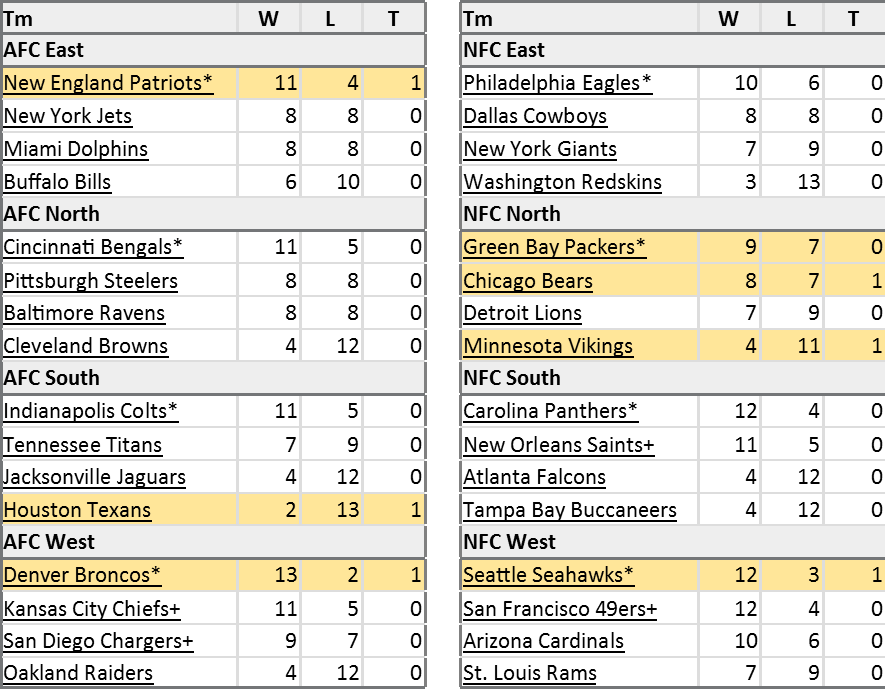
There isn’t a ton of significant changes here. Despite beating the Vikings instead of tying them, the Packers still need to beat the Bears in Week 17 to clinch the NFC North. Seattle, New England, and Denver’s playoff positioning is still unchanged. The playoffs (and even draft positioning) are identical. This would have been the first Super Bowl matchup between teams that each had a tie during the regular season. The fact that were robbed of that history is a great reason to establish a 10 minute overtime rule.
On a Packers note, giving the Packers an outright win over the Vikings would've made that game one of the greatest in Packers history. Luckily we would get two others later in the year.
2014 NFL Season
Just one of the 11 overtime games played in 2014 would have changed with a 10 minute overtime.
Games Changed
![]()
Revised 2014 NFL Standings
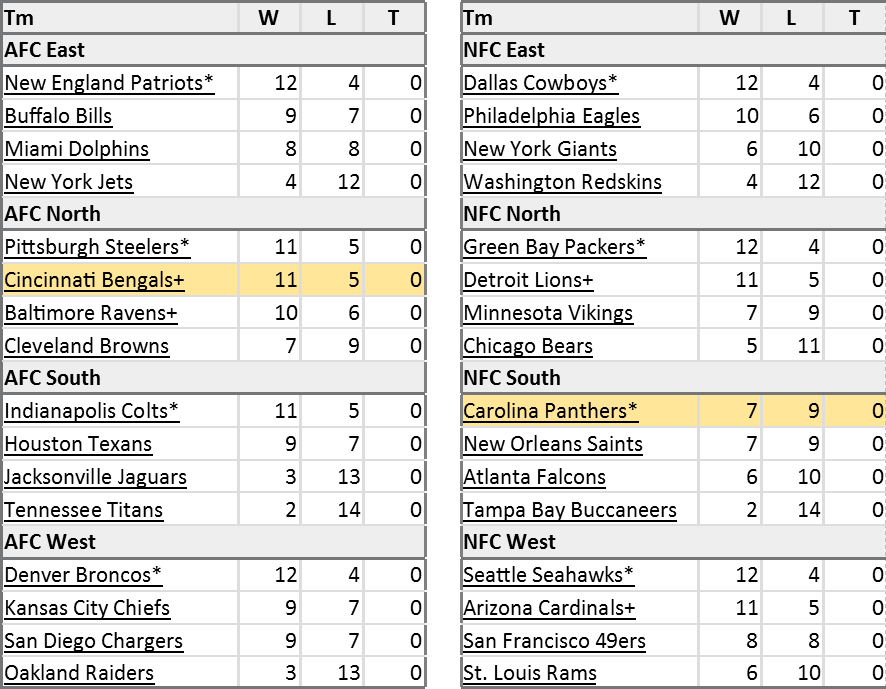
Initially, it looks like this result changes a lot, as it pulls both the Bengals and Panthers into a tie for first place in their respective divisions. However, once you apply tiebreakers, the result is the same as the real 2014 season. Pittsburgh had a better record than the Bengals within the division, so Cincinnati still would have to have beaten the Steelers in Week 17 to claim the AFC North crown. Carolina had split its season series with the Saints and scored a superior sum of success in the South, thus securing the South for the……Panthers. (Ran out of S words.) The Falcons also swept the Saints that year, so this change in result still makes the Panthers and Falcons in Week 17 a win-and-in scenario for both teams. The lack of a 10 minute overtime rule did nothing in this case but prevent a 7-9 team from winning its division for the second time in five seasons.
2015 NFL Season
The 2015 season saw 21 games go to overtime. However, only five would have had a different result if there were a 10 minute overtime rule.
Game Changed

The Rams and 49ers tie for the 3rd time in eight games. Yikes. This is also a case where I am very literally enforcing the 10 minute overtime rule in a way that is perhaps unnatural. Denver kicked a game-winning field goal to beat the Browns with 4:56 left in overtime. The play began with 5:00 on the clock and the clock only stopped because the Browns called a timeout. In a real-world application of the 10 minute overtime rule, the Broncos would’ve kicked the ball before the clock ran out. But who cares? For the purpose of this scenario, let’s say Broncos Coach Gary Kubiak let his decades of experience cloud his mind and he forgot that the NFL had enacted such a ridiculous rule and let the clock run out. You should have heard all the crazy things that Skip Bayless said about him on First Take.
Revised 2015 NFL Standings
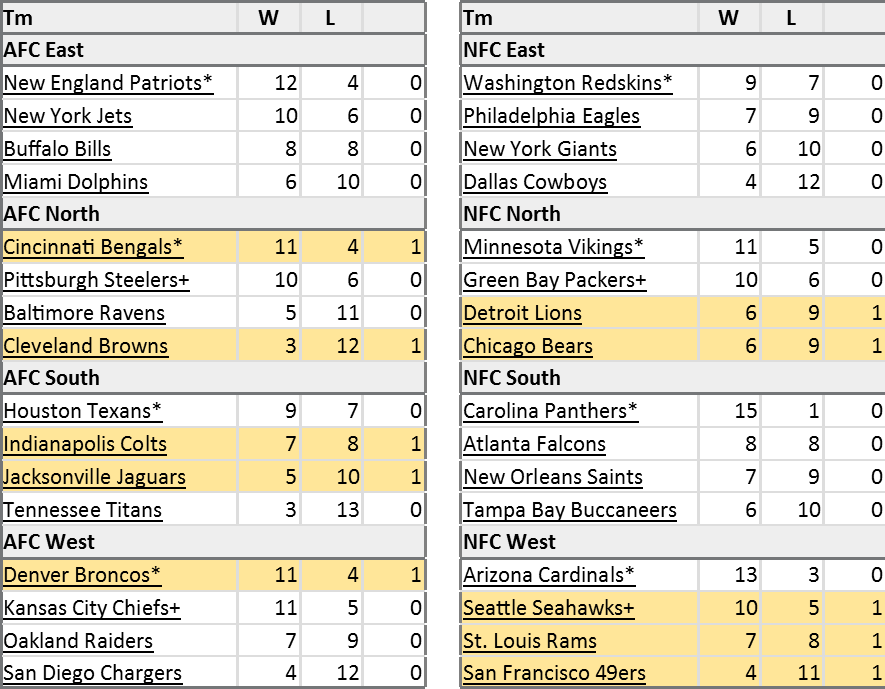
What an eyesore. It looks like standings you would see around Thanksgiving in the NHL. Despite all that ugliness, there isn’t much in the way of ramifications. Denver and Cincinnati played in Week 16, so the winner of that game still gets the first round bye. However, because of Konfused Kubiac (which undoubtedly would’ve been the topic line on the screen during the Week 6 First Take segment), the Patriots get homefield advantage throughout the AFC Playoffs instead. The Broncos would host the Kansas City Chiefs in Divisional Round with Pittsburgh going to New England rather than Denver. In Week 10 of 2015, the Chiefs beat the Broncos in Denver 29-13 and held Peyton Manning to 5-20 for 35 yards and four interceptions. It’s not hard to imagine the Chiefs beating Denver again OR the Broncos staying with Brock Osweiler in the playoffs. Had Denver entered Week 17 with a 10-4-1 record, the Patriots already would’ve clinched Homefield. Perhaps Kubiac doesn’t panic at the thought of losing to the Chargers and lets Brock stay in the game and figure it out. The defense and running game come to Brock’s rescue like they did for Peyton in real life and the Broncos go to the playoffs with Peyton on the bench. If there were a 10 minute overtime rule, Brock Osweiler might still be the Broncos Quarterback. Well, at least in 2016.
Regardless, it’s safe to assume that the Patriots win the AFC. Peyton never had much success in Foxboro and we saw twice this past year how bad Osweiler is in New England. The Pats have always owned the Steelers in January. Had the Chiefs won, Andy Reid probably would’ve assumed that the 10 minute overtime rule was in effect in the playoffs too and took four knees in the middle of overtime to play for the tie, turned it over on downs, and watch with a bewildered look as New England drove down the field and kicks a game-winning field goal.
Swapping the Patriots for the Broncos in Super Bowl 50 is likely very good news for the Panthers. Denver was the only team in 2015 to slow down the Panthers. The Patriots had a decent defense, but Carolina likely would’ve been able to move the ball. I slightly favor the Panthers in that matchup, but at the very least, we would have been treated to a much more exciting football game.
(As a side note, doesn’t the unstoppable Panthers offense already feel like it happened like a decade ago? How fast things change.)
2016 NFL Season
Last season saw 13 contests go into overtime. Five of them would have been different with just 10 minutes of overtime.
Games Changed

Now those are some eye-opening results. Unlike prior years, the 2016 games that would have been affected by a 10 minute overtime are filled with playoff contenders. Also interesting, two overtime games from last season would’ve had the opposite winner had there been five fewer minutes of overtime. By changing just these five games, it wreaks havoc on the 2016 NFL Standings.
Revised 2016 NFL Standings
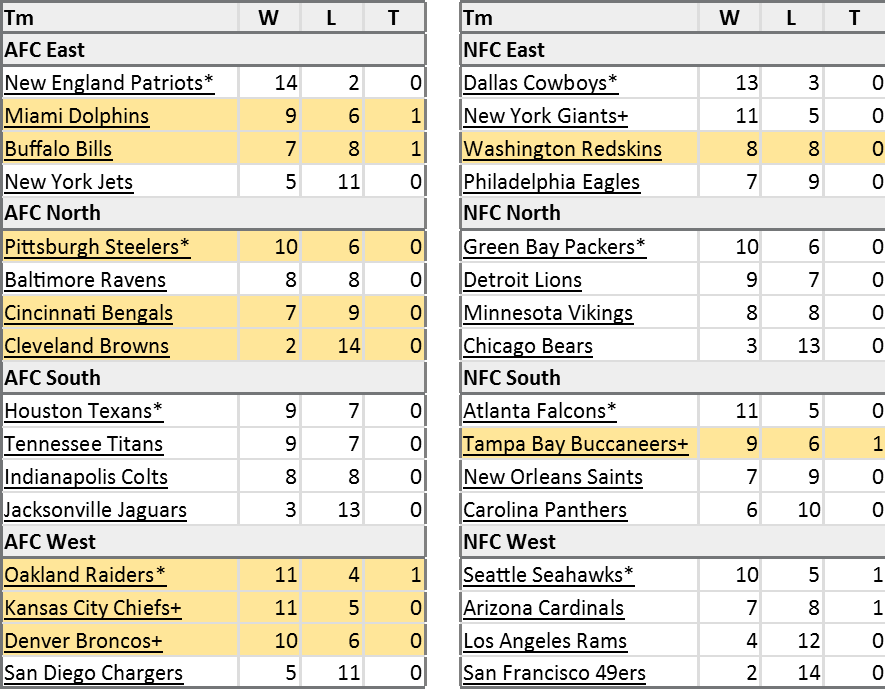
Each of the three AFC West playoff contenders was involved in a game that would have had a different result with a 10 minute overtime period. Because of these changes, the Oakland Raiders now win the AFC West and get a first round bye. Making things even more interesting, the Raiders would have known that a win over the Colts in Week 16 would have clinched them the AFC West Championship and locked them into the Number Two Seed regardless of what happened in Week 17. Would Derek Carr have been in the game with eight minutes left and a 19 point lead in this scenario? If there had been a 10 minute overtime rule last season, Derek Carr likely doesn’t break his leg and is at full strength for the 2nd seeded Raiders in the playoffs.
There are more changes in the AFC Playoffs. Denver’s win over Kansas City and Miami’s tie with Buffalo puts the Broncos into the last Wildcard Spot instead of the Dolphins (thank goodness). With a 10 minute overtime rule, last year’s AFC Playoffs would have looked like this:
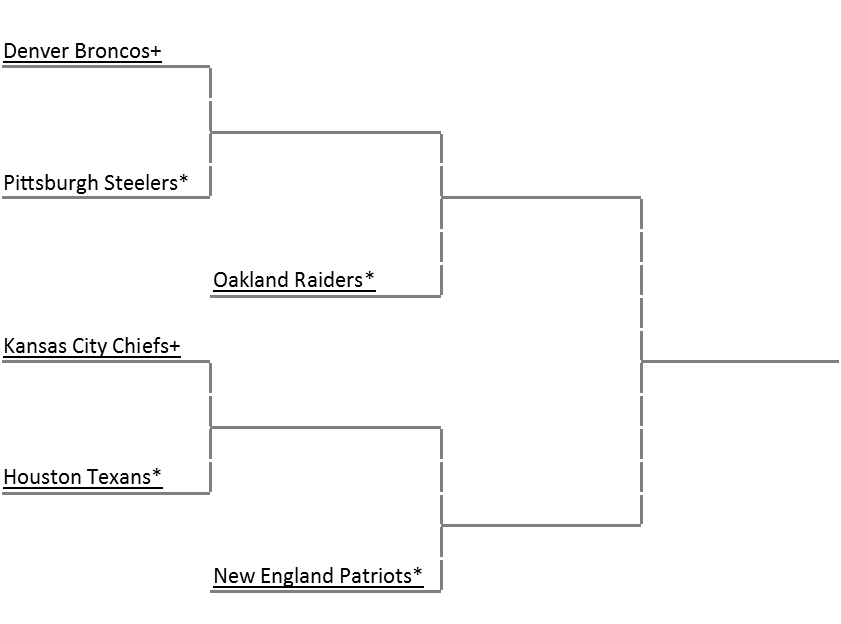
While New England is still clearly the favorite, this playoff bracket is much more interesting. You replace an overachieving Dolphins team (who is playing with their backup quarterback), with the 4th best defense in the NFL. You also put Derek Carr back at the helm of the powerful Raider offense. I am still confident that the Patriots would have won the AFC, especially having seen how poorly the Raiders played in the cold at Kansas City. I am also confident that the games would’ve been much better and we likely would’ve only had to watch one Texans playoff game. That’s always a good thing.
The NFC playoffs aren’t unscathed either. The Buccaneers would have tied the Raiders rather than lost to them, giving them a 9-6-1 record. This would have been good enough to eliminate the loser of the Packers/Lions NFC North Title game. Since the Packers won, Detroit completes its December freefall and tumbles right out of the playoffs. Tampa Bay goes to Seattle to face a team they had defeated 14-5 about six weeks prior. Had the Buccaneers won, they would have gone to Dallas and sent Green Bay to Atlanta a week early. If this happens, Dallas likely hosts Atlanta in the NFC Title game and very well could have gone to the Super Bowl to face the Patriots. I’m not sure they would have won, but I am sure that if they would have had a 28-3 lead with 18 minutes to play, they would be the Champions today.
Finally, and perhaps most important long-term, had there been a 10 minute overtime last season, the San Francisco 49ers would have had the first pick in the NFL Draft. Cleveland beating Pittsburgh in Week 17 would have cost them Myles Garrett. We’ll have to wait and see how important that is to NFL history.
Summary
I’m against the new overtime rules because it WILL lead to more ties. From 1974 to 2011, there were 17 ties. By applying the 10 minute overtime rule to the last five years with the two-possession rule, it created 15 ties in five years. As a fan, there is nothing like investing hours into a product only to have no winner. I will acknowledge that many of the scenarios I outlined here ended up being BETTER than the actual real-world scenarios, but that’s not the point. This is illustrating how much could have changed with such a minor change. I believe the NFL owners made this decision flippantly in a very weak effort to shorten games. There are claims that this is being done to shorten games for player safety reasons. If this is the case, and ties are of no concern, why play overtime at all? This will reduce the length of a tie game by 6%. I suspect the real reason is to shorten games so they don’t go over their time slots and network shows can start on time.
I doubt the NFL Brass realizes how each of their minor tweaks butterflies into a major change. Look how different the last five years would have been with this seemingly “minor” change. Minor changes can have major effects on the product and NFL history. As a fan, I don’t like how little the owners and Rules Committee seem to think these things through. They had a goal and they’ll get to it whether it’s good for the game or not. It’s hard to get emotionally invested in a league that would create a rule that might cost your favorite team a playoff spot because they want 60 Minutes to start on time.
And for cripes sake, DO NOT buy a ticket to a Rams/49ers game.
Eric Drews
Host
Green and Gold Forever
@GreenGold4Ever


Comments (0)
To leave or reply to comments, please download free Podbean or
No Comments
To leave or reply to comments,
please download free Podbean App.